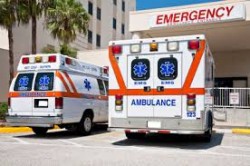What to Know about Methadone Overdose Treatment
With opiate addiction on the rise, methadone treatment is becoming more popular. Doctors first started using methadone to treat addiction in the 1960s. Methadone binds to the opiate receptors in the brain and stops the cravings for the original drug. It works so well that it is still in use today. Unfortunately, methadone is as addictive as most opiates. What you need to know about methadone overdose is why people overdose, the signs and symptoms of an overdose, steps to take if someone is overdosing, emergency room treatment, and what happens after the emergency room.
Need help finding treatment? Call 800-678-5931(Paid Advertiser) toll free anytime.
Why People Overdose on Methadone

If someone overdoses on methadone they need to get help immediately.
According to the National Institute on Drug Abuse methadone administered in a clinical setting is best. This is because it is easy to both relapse to opiates and overdose if a patient is not closely supervised.
There are several reasons why people overdose on Methadone. One of the main reasons is that methadone does not have the same high feeling as an opiate does. There is no rush of euphoria. This prompts users to take more and more of the methadone, trying to get high. Taking too much causes an overdose.
Another reason why people overdose, is that they are new. New methadone users may not understand their dosing schedule. They take too much or take the methadone too often. methadone is dangerous in high quantities.
Some people do not understand that they cannot take an opiate with methadone. In order to gain the high they take methadone with heroin or another opiate. This causes a chain reaction in the system that leads to an overdose. The same thing happens when they use alcohol, cocaine, or other illicit or prescription drugs with methadone.
Others overdose because they are using methadone as a recreational drug. Without dosage information methadone, a long lasting painkiller, is easy to overdose on. Since it is an opiate but there is no appreciable high, people tend to get into trouble if they take it without being under a doctor’s care.
The Signs and Symptoms of Methadone Overdose
There are many symptoms of methadone overdose. If you know someone is on methadone and you see any of these symptoms, you could be witnessing an overdose. If you are on methadone and have any of these symptoms seek medical attention immediately. According to the Drug Enforcement Agency the symptoms of a methadone overdose are:
- spasms or twitching,
- weak pulse or irregular heartbeat,
- bluish lips skin or fingertips under the nails,
- unconsciousness or sudden passing out,
- severely dilated pupils or pinpoint pupils,
- cold skin or clammy skin,
- confusion or irrational thinking and actions,
- weakness or dizziness,
- severe sweating for no reason,
- severe drowsiness, and
- shallow or labored breathing.
These are the most obvious symptoms of methadone overdose. A methadone overdose is very dangerous. Just a bit too much methadone can cause these symptoms. The consequences of a methadone overdose are:
- brain damage or permanent neurological damage,
- organ damage including irreparable damage to the heart,
- damage to the veins and arteries, and
- death.
These consequences are severe and most often permanent. They are consequences of not seeking treatment or not getting treatment fast enough. Time is extremely important when it comes to methadone overdose.
Steps to Take if Someone is Overdosing on Methadone
There are steps that you can take if you suspect a methadone overdose. These steps can save a person’s life if done quickly.
- Call poison control or emergency services immediately. Give them the patient’s height, weight, and the best description of their condition. Tell them what they took and the dosage information if you have it, as well as the time it was taken and the amount that was taken.
- Listen to the operator’s instructions.
- Get the person who is overdosing to the hospital as soon as possible, either by car or by ambulance.
- Tell the hospital what the person was taking. If it was Methadone or Methadone and a combination of other drugs, the emergency room doctors and nurses will need to know.
These steps could save a person’s life if done quickly and efficiently. Always give all of the information you have about the patient to the operator and the doctor or nurses. They need this information to treat the patient properly.
We can help you find addiction treatment. Call 800-678-5931(Paid Advertiser) toll free anytime.
How does an Emergency Room Treat a Methadone Overdose
The emergency room treats a methadone overdose by administering fluids, performing a gastric lavage, possible intubation, ingestion of activated charcoal, and giving the antidote for methadone overdose. They may do one or all of these things. Depending on the severity of the situation the patient is admitted, released, or admitted into a rehabilitative facility.
What Happens after the Emergency Room
Methadone overdose is a very severe illness and leads to several permanent issues. It is possible that the overdose patient has permanent damage. The hospital evaluates the situation and decides whether the patient is safe to release. After release the patient needs counseling, support, and to see their doctor. It is important to determine the reason for the overdose so it does not happen again.
Methadone is a proven therapeutic replacement therapy for opiate addition. Unfortunately, it carries some risks. Death from methadone overdose can be prevented, if you know what methadone overdose treatment is. Knowing what to do in the event of an overdose can prevent a tragic event from happening.